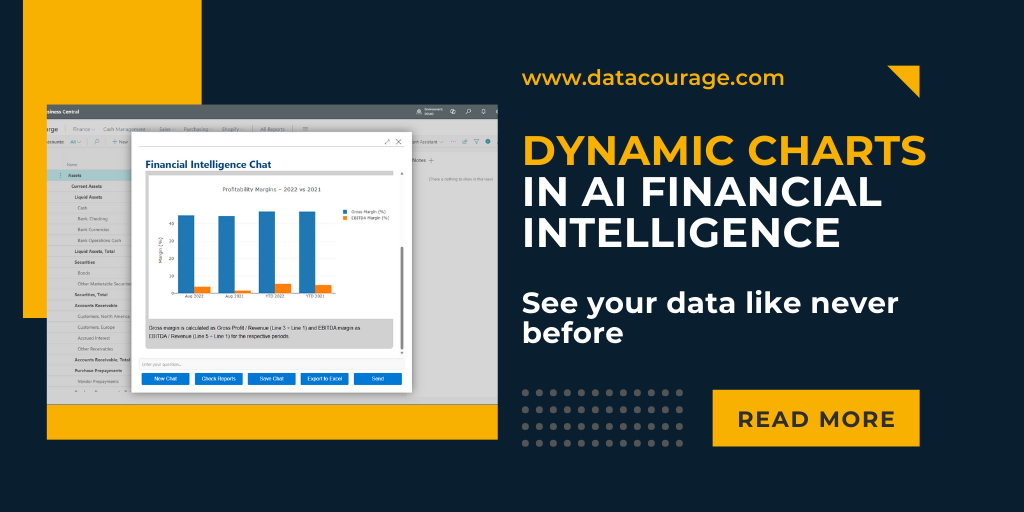Bring your numbers to life with AI-powered Financial Intelligence
Every number in your business reveals something. It may signal a trend, expose a risk, or show where growth is happening. When that data hides in...
3 min read
Data Courage Jul 28, 2025 4:13:02 PM

Finance teams today are navigating a uniquely demanding landscape. With evolving compliance requirements, tighter margins, and a growing need for agility...
the role of finance is no longer limited to historical reporting. Finance leaders are expected to deliver timely insights, guide operational decisions, and support long-term strategy — often with leaner teams and systems that weren’t built for this pace.
For organizations using Microsoft Dynamics 365 Business Central, there’s no shortage of data. The challenge lies in accessing it efficiently, understanding it in context, and acting on it — without bottlenecks or long waits for reports.
Finance teams using Microsoft Dynamics 365 Business Central often face slow reporting cycles, manual data handling, and limited access to real-time insights. AI-powered tools embedded directly within Business Central can solve these challenges — enabling natural language queries, instant P&L and balance sheet generation, multilingual support, and faster decision-making. The result? Less time formatting data, more time understanding it.
Business Central provides a robust foundation: general ledger data, dimensions, customer transactions, cost centers, and budgets are all there. But day-to-day financial questions still require jumping between Excel, prebuilt reports, and Power BI dashboards. Finance professionals face hurdles such as:
Many teams still spend more time compiling data than analyzing it. And when fast answers are needed — in meetings, across departments, or during month-end — the gap becomes clear.
Modern finance teams need more than access to data — they need a way to interact with it, uncover context, and gain clarity at speed. What’s changing in revenue and why? Where are margins slipping? How do costs compare across regions or time periods?
To meet this demand, companies are rethinking the role of their ERP — not just as a system of record, but as a system of insight.
Key capabilities that support this shift include:
Instead of relying on Excel templates or waiting for static reports, finance teams increasingly expect automated P&L and balance sheet generation — tailored to their specific chart of accounts and available in real time.
Rather than clicking through layers of menus or designing complex queries, finance users want to ask questions directly — in plain language — and get structured, trustworthy answers instantly.
To understand the business, users must slice performance by region, product, department, or customer segment — ideally without building new reports for every scenario.
Analyzing variances month-over-month, quarter-over-quarter, or year-over-year is core to financial storytelling. Comparing performance with context should be easy, not an exercise in spreadsheet gymnastics.
For global finance teams, the ability to query and interpret financial data in multiple languages is essential. It supports collaboration and ensures alignment — especially across European and international teams.
Let’s consider a few scenarios many Business Central users will find familiar:
A finance manager wants to prepare for a board meeting by understanding which product lines contributed most to gross profit changes.
A CFO receives a question during a leadership call about balance sheet trends by region — and needs to answer without deferring to the BI team.
A controller needs to validate that month-end variances in operating expenses align with forecasts, and share findings in both English and French.
These use cases aren’t solved by just “more dashboards.” They require tools that bring together the ERP’s transactional depth with flexible, intelligent access to financial narratives.
For finance teams to become more strategic and less reactive, tools should offer:
Real-time, self-service insight without waiting for IT
The ability to go from question to answer in seconds
Insightful summaries and variance commentary
Support for distributed teams with different language needs
Deep integration with Business Central to ensure consistency
AI is often discussed in abstract terms, but in finance, its impact is tangible when it supports everyday work. Whether through automated report generation, conversational queries, or built-in commentary that highlights performance drivers, AI is becoming a practical tool for modern finance functions.
It doesn’t replace the analyst’s judgment or the CFO’s strategic acumen — but it removes the noise and accelerates the journey from data to decision.
For Business Central users looking to add clarity, speed, and structure to their financial processes, there’s a clear opportunity to enhance the ERP with intelligent tooling. The best solutions build directly on top of Business Central, require minimal setup, and reflect the language and logic finance professionals use daily.
AI Financial Intelligence is one such solution. Built specifically for Microsoft Dynamics 365 Business Central, it enables finance teams to:
Whether you’re closing the month, preparing for a board meeting, or answering leadership questions on the fly, AI Financial Intelligence helps transform Business Central into a true financial decision-making platform.
Because when finance teams stop spending time gathering numbers — and start focusing on what they mean — real impact follows.
Ready to rethink what your finance stack can do?

Every number in your business reveals something. It may signal a trend, expose a risk, or show where growth is happening. When that data hides in...

What happens when a finance team no longer has to wait days for reports, chase down spreadsheet errors, or rely on IT for answers?

Financial leaders need real-time insights to make fast, informed decisions. Yet for many CFOs, CEOs, and finance analysts, financial reporting...